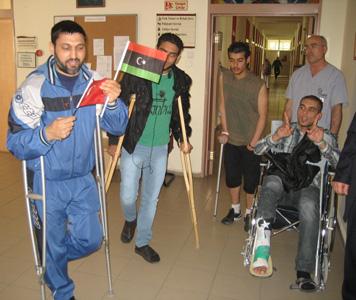Turkey’s future in the new Middle East
Wounded Libyan are welcomed in Turkey (Photo: Matthew Brunwasser)
By Matthew Brunwasser
If you’re going to be hospitalized, you could do a lot worse than the Urla state hospital on Turkey’s Aegean Coast.
Ali Gleib is one of some 300 wounded Libyans brought to Turkey for medical care in April. He says he was defending his house from government forces when it was struck by a tank shell. He was hit by shrapnel and faced a four-day wait in Misrata for urgent surgery.
“I’m at the Libyan hospital and there’s some guys talking about a ship coming from Turkey to help us,” Ali Gleib said. “So the doctors talked to me about moving to the ship.”
After Turkey negotiated a 12 hour ceasefire in the port area with the government, Ali Gleib was driven to the ship by his brother.
“I’m very thankful to the government of Turkey, the doctors and the manager of the hospital,” Ali Gleib said. “They are so lovely. Now I can say they are my brothers here. I have another family here in Turkey.”
Kinder, gentler
Turkey has big ambitions for expanding its role as a regional power. And this image of a kinder gentler Turkey is exactly what it wants to project, both at home and abroad. This is reflected in its approach.
“Basically emotional, it is derived from some historical and cultural kinship,” said Nazif Mandaci, a representative from the international relations department at Yasar University in Izmir.
Mandaci says that Turkey is trying hard to show that it cares about the people of Libya. But he says that Turkey also needs to balance its humanitarian approach with a practical one. Since no one knows who will come out on top, Turkey needs to send messages to both sides in the conflict.
“Paying lip service to the Gaddafi regime, I still continue to recognize that you are the legitimate ruler of the Libyan people,” Mandaci said. “But on the other hand, you have to change yourself. You have to adopt some reforms that will redress the grievances of these people.”
Neo-Ottomanism
Turkey’s also engaging in what’s being called neo-Ottomanism. That is, trying to resurrect its influence in the lands of its former empire, which stretched from Algeria to Iraq to Hungary. Aylin Guney, also a professor of international relations at Yasar University, said Turkey is doing that by, among other things, increasing its influence in NATO. While at the same time showing that it’s not like other NATO countries that care only for their own interests and Libya’s oil wealth.”
Guney added that Turkey wanted to project an image as a normative power who would run to the help of the Libyan people in protecting them from the French.
“Particularly the French within NATO, Guney said. “So acting within NATO, but at the same time protecting civilians from the abuse of power.”
It’s an ambitious policy, Guney says, trying to appeal to Turks at home, Libyans in Libya and the region as a whole. For its part, the Turkish government denies that it’s playing politics with humanitarian aid. Selcuk Unal, the spokesman for the Turkish Foreign Ministry, says Turkey’s interest is in helping people and helping to create a prosperous and democratic Libya.
“We always want stability in our adjacent areas, our message is I think clear, we don’t want bloodshed and instability in our region,” Unal said. “That’s why we are increasing our efforts to help all peoples in the region.”
As of this week, the Turkish government says that about 90 of the Libyans have recuperated and are on their way back to Libya at their own request. Officials say they can stay as long as they want.
